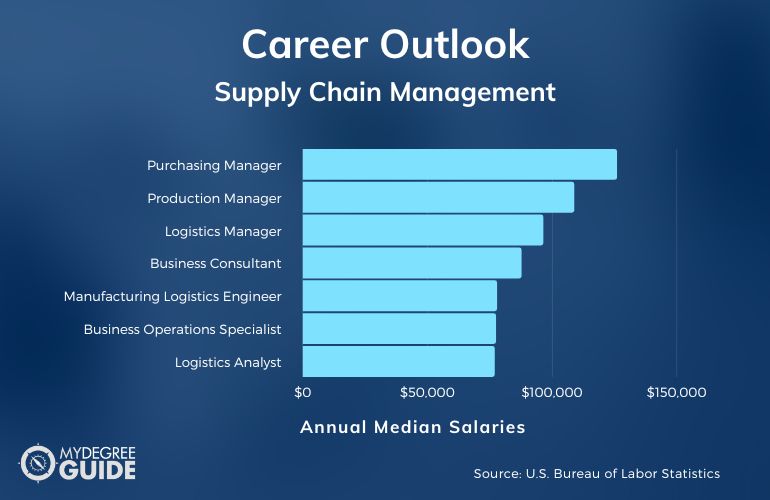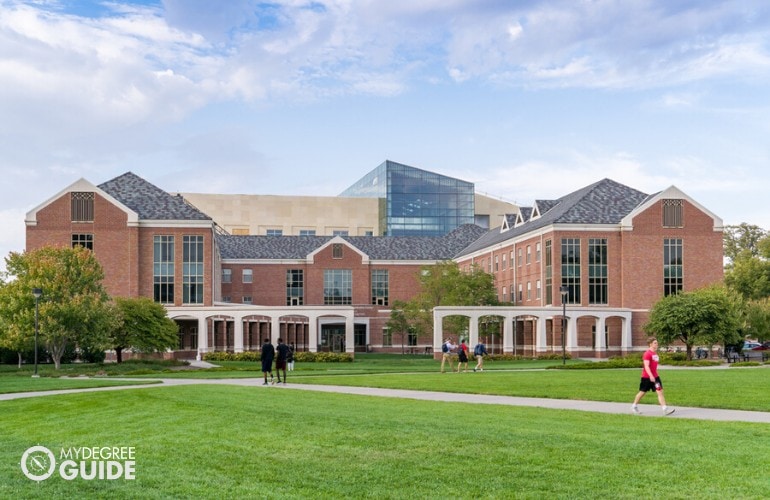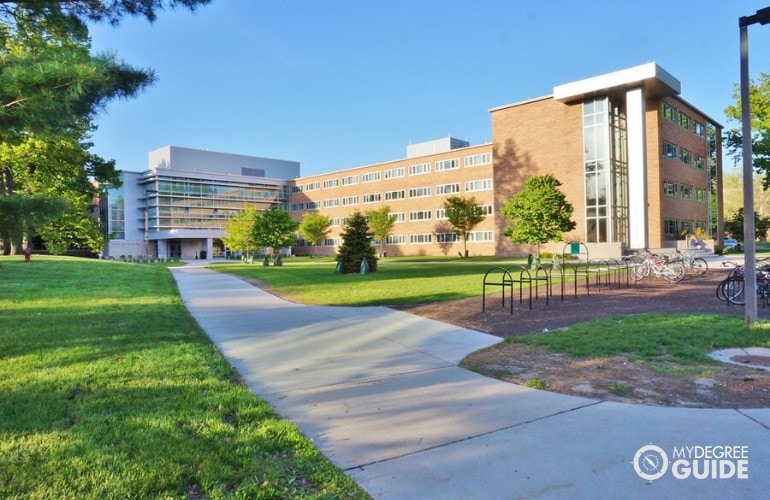Every day, goods and materials move from one place to another, and people who have an Online Supply Chain Management Degree are often the ones overseeing the process.

Whether you’re interested in procurement, logistics or transportation, earning a supply chain degree can help provide the necessary education and credentials for getting started in this field.
Editorial Listing ShortCode:
Compare supply chain management degrees and career options to see which path best matches your goals and interests.
Universities Offering a Bachelor’s in Supply Chain Management Online
Methodology: The following school list is in alphabetical order. To be included, a college or university must be regionally accredited and offer degree programs online or in a hybrid format.
1. Anderson University
Anderson University started in 1911 in South Carolina as a faith-based college. All religions are welcome at this private college with undergraduate and graduate degree levels that include doctoral programs. There are more than sixty programs to choose from in study areas that include supply chain management, cybersecurity, and Kinesiology.
- BBA in Supply Chain Management
Anderson University is accredited by the Commission on Colleges of the Southern Association of Colleges and Schools.
2. Arizona State University
Students searching for traditional education options or an innovative distance learning program often turn to Arizona State University. ASU has been offering public education since 1886 and is a leader in research and social awareness worldwide.
ASU stands out in the education world, giving students a multitude of options to obtain a graduate or undergraduate degree.
- BS in Supply Chain Management
Arizona State University is accredited by the Higher Learning Commission of the North Central Association of Schools and Colleges.
3. Athens State University
Athens State University offers a welcoming, inexpensive option for public education. Stating in 1998, ASU has transformed throughout the years to meet the needs of its students.
Now offering fifty-plus majors that assist students in gaining undergrad and graduate degrees, Athens State strives to make each student feel at home on campus or online.
- BS in Logistics and Supply Chain Management
Athens State University is accredited by the Southern Association of Colleges and Schools Commission on Colleges.
4. Ball State University
Ball State University has an educational course available to students on every stage of their adult learning. From two-year degrees to post-graduate professional degrees, Ball State University has a plan to need the needs of all students.
Opening in 1918, BSU provides a flexible public education to those who need a step up in their career or personal development.
- BS in Logistics and Supply Chain Management
Ball State University is accredited by the Higher Learning Commission.
5. Bellevue University
Taking education to the next level, Bellevue University has a variety of courses that are offered entirely through its dynamic distance learning platform.
Opening in 1966, this public school helps students who attend to acquire an undergrad, doctoral, or graduate degree while studying course majors such as business, supply chain management, and arts and science.
- BS in Supply Chain, Transportation and Logistics Management
Bellevue University is accredited by the Higher Learning Commission.
6. Colorado Christian University
Colorado Christian University is a religious-based, private school that started in 1914. Offering all levels of degrees, from two-year to doctorate, CCU strives to teach kindness, inclusion, and leadership to students in their many areas of study. Colorado Christian University invites individuals from all faiths to take part in its online and in-person courses.
- BS in Logistics and Supply Chain Management
Colorado Christian University is accredited by The Higher Learning Commission.
7. East Carolina University
Commenced in 1907, East Carolina University is a world-renowned, public postsecondary school that teaches students through campus-based learning and virtual learning opportunities. Students at ECU participate in curricula that teach the fundamentals of degree programs that lead to undergraduate, graduate, and doctoral degrees.
ECU offers a vast array of study abroad programs and other learning opportunities.
- BSBA in Operations and Supply Chain Management
East Carolina University is accredited by the Commission on Colleges of the Southern Association of Colleges and Schools.
8. Embry-Riddle Aeronautical University
As a leader in aviation and aerospace, Embry-Riddle Aeronautical University opened in 1925. Today, ERAU is one of the largest private schools in its field. It serves students all over the globe to help them achieve an esteemed undergraduate, graduate, and professional degrees in various programs.
- BS in Logistics and Supply Chain Management
Embry-Riddle Aeronautical University is accredited by the Southern Association of Colleges and Schools Commission on Colleges.
9. Florida International University
Florida International University is a public postsecondary school that opened in 1965. Located along the coast of FL, FIT allows students to apply skills and knowledge as they move forward in an array of undergrad and graduate degrees. Allowing for online and traditional learning, FIT is a leader in science and space studies.
- BBA in Logistics and Supply Chain Management
Florida International University is accredited by the Southern Association of Colleges and Schools Commission on Colleges.
10. Florida State College at Jacksonville
Opening in 1966, Florida State College at Jacksonville works to lead the region in giving students an innovative and competitive public education. With a pathway to associate and four-year degrees, FSCJ has a variety of study areas that include majors such as supply chain management, healthcare, and technology.
- BAS in Logistics
FSCJ is accredited by the Southern Association of Colleges and Schools Commission on Colleges.
11. Franklin University
Created in 1902, Franklin University is located in the great state of Ohio and offers a comprehensive private school education.
Franklin University provides graduate, undergraduate, and doctorate programs to students across the globe with serval satellite campuses and a distance learning platform. A small sample of programs offered at FU includes business and healthcare.
- BS in Operations and Supply Chain Management
Franklin University is regionally accredited by the Higher Learning Commission.
12. Kennesaw State University
Founded in 1963, Kennesaw State University is a vast public college located in the state of Georgia. Students who attend Kennesaw University have access to KU’s many undergrad, graduate, and doctoral degrees. KU reaches students in multiple states and other countries using its online learning platform. They also have study abroad programs.
- BAS in Supply Chain Logistics
Kennesaw State University is accredited by the Southern Association of Colleges and Schools Commission on Colleges.
13. Lindenwood University
Lindenwood University is a private institution that began in 1827. As one of the oldest postsecondary schools in the region, Lindenwood University has a variety of undergraduate and graduate programs in a diverse choice of majors.
Professional degree programs are also available at LU, and it has online and evening classes to give students nontraditional options for gaining their education.
- BABA in Supply Chain Management
- BSBA in Supply Chain Management
Lindenwood University is accredited by the Higher Learning Commission.
14. Lipscomb University
Established in 1971 by the Christian Church, Lipscomb University offers students a private postsecondary education with a liberal arts foundation. Located in Nashville, TN, Lipscomb University has numerous undergraduate, graduate, and doctorate degrees in many subject areas.
LU combines faith-based learning with quality subject matter to give students a well-rounded learning experience.
- BA in Supply Chain and Operations Management
- BPS in Supply Chain and Operations Management
- BS in Supply Chain and Operations Management
Lipscomb University is accredited by the Southern Association of Colleges and Schools Commission on Colleges.
15. Metropolitan State University
Metropolitan State University has been training professional in the community since 1971. This public university has a multitude of undergraduate, graduate, and doctoral programs that aim to help students excel in their areas of study. MSU has student-centered programs that allow for flexible learning styles to take part in online and on-campus learning.
- BS in Supply Chain and Operations Management
Metropolitan State University is accredited by the Higher Learning Commission.
16. Minnesota State University – Moorhead
Minnesota State University – Moorhead began in 1887 as a public learning facility. It offers more than seventy undergraduate study areas and more than ten graduate degrees.
Some of the programs offered at Minnesota State University include business, human service, communication, and nursing. Notable alumni include several political figures, radio hosts, and businessmen.
- BS in Global Supply Chain Management
Minnesota State University Moorhead is accredited by the Higher Learning Commission.
17. Northern Arizona University
Northern Arizona University started making a mark in public education in 1899. Northern Arizona University applies research and technology to all of its 150 plus study areas with a track to four-year to post-graduate degrees. It has a dynamic e-learning program that allows for flexible options to busy adults looking for a promising educational opportunity.
- BAS in Logistics and Supply Chain Management
Northern Arizona University is accredited by the Higher Learning Commission.
18. Northern Kentucky University
Beginning in 1968 as a public school, Northern Kentucky University works to make a difference in the community by educating adults to lead area and global industries.
With more than seventy majors and a path for learners to earn undergraduate and graduate degrees, NKU offers on-campus and virtual learning that reduce educational obstacles for working students.
- BSBA in Global Supply Chain Management
Northern Kentucky University is accredited by the Southern Association of Colleges and Schools Commission on Colleges.
19. Oregon State University
Oregon State University has a phenomenal amount of degree programs that allow students to attain bachelor, master’s, and higher degree levels while getting a globally recognized public education. Opening in 1868, OSU uses practical experience with innovative technology to helps student find their place in the academic and career world.
- BABA in Supply Chain and Logistics Management
- BSBA in Supply Chain and Logistics Management
Oregon State University is accredited by the Northwest Commission on Colleges and Universities.
20. Portland State University
Portland State University began in 1946 and is an educational powerhouse. This public research facility allows students to test the boundaries of creative thinking and innovation to earn degrees ranging from bachelors to doctoral in more than 200 areas.
Samples of the degree offered at PSU include Global supply chain management and Business of Craft Brewing.
- BS in Supply and Logistics Management
Portland State University is accredited by the Northwest Commission on Colleges and Universities.
21. Southern Wesleyan University
South Carolina is the location of one of the most esteemed private schools in the region. Created in 1906, Southern Wesleyan University has various study options that allow learners to obtain an associate, bachelor’s, graduate, and professional degrees.
Its beautiful campus and online courses enable students to engage with a diverse population.
- BSBA in Supply Chain Management
Southern Wesleyan University is accredited by the Southern Association of Colleges and Schools Commission on Colleges.
22. Temple University
Temple University opened in 1884 and has adapted to the needs of society over the years. With over four-hundred programs that allow students to undergraduate, master’s, Ph.D., and doctorate degrees, Temple University employs top professionals in their field to teach students using hands-on strategies and critical thinking skills.
Temple uses online and in-person platforms for instruction.
- BBA in Supply Chain Management
Temple University is accredited by the Middle States Commission on Higher Education.
23. University of Arkansas
Higher education degrees are vast at the University of Arkansas, and each degree is filled with the opportunity to work with faculty members who are experts in their fields. Beginning in 1971, UA is a global, public postsecondary school that has an array of doctoral, graduate, and undergrad degrees in over a hundred majors.
- BSBA in Supply Chain Management
The U of A is accredited by the Higher Learning Commission.
24. University of Massachusetts – Global
Established in 1958, the University of Massachusetts Global is an educational and economic anchor in its community. UMass Global provides students with a private education that is designed to develop the skills and content knowledge needed to gain higher career levels and personal achievement.
UMass Global’s range of programs allows students to procure degrees that range from associate to doctoral.
- BBA in Supply Chain Management and Logistics
- BBA in Supply Chain Systems
The University of Massachusetts Global is accredited by the WSCUC Senior College and University Commission.
25. Western Illinois University
Western Illinois University is a public school for adults looking to enhance their knowledge using research and service-based curriculum that can lead to bachelor’s, master’s, and doctoral educational levels.
Starting in 1899, WIU has more than one-hundred fields of study and certificates in innovative majors such as civil engineering, fire protection services, nursing, and education.
- Bachelor of Business in Supply Chain Management
Western Illinois University is accredited by the Higher Learning Commission.
Online Supply Chain Management Degrees
Click on the field that most interests you to jump to that section of the guide:
Although supply chain management and logistics are similar fields, there can be some differences in the day to day duties.
Supply Chain Management

Studying for a degree in supply chain management can help prepare you to oversee distribution processes from beginning to end. Whether you want to be involved with coordinating the transportation of raw materials, securing competitive pricing or managing a distribution center, a supply chain degree can help you achieve your goals.
The courses for a supply chain management program are designed to introduce students to the fundamental concepts in supply chain management, both at home and abroad. Common topics of study are warehousing, transportation, and purchasing.
Editorial Listing ShortCode:
There’s a good deal of data analysis that goes into supply chain management positions, so classes on statistics and modeling are typically included as well. There will probably be business classes on accounting, finance, and management also.
With this degree, you might find work as a buyer or a purchasing agent. You could also pursue jobs in logistics, warehousing or distribution or you might simply hold the title of supply chain manager.
Logistics & Transportation

A degree program in logistics and transportation focuses on one sector of the supply chain field. If your interest lies in making sure that material and products get where they need to go, then this degree might be for you.
To become logistics experts, students take classes on the various forms of transportation that are used for moving goods from one place to another. The topics may include rail, truck, ship, and air and pipeline transportation. Another important topic of discussion is the intricacies of transporting items across international borders.
Editorial Listing ShortCode:
Other common topics of study include how to store items, package them, and oversee distribution. There may be classes on logistics technology, and you may learn to evaluate the financial impacts of your transportation choices.
Your studies may prepare you to work as a transportation or logistics manager. You could also pursue work as a consultant or an analyst who advises other organizations on logistics matters.
Supply Chain Management Careers & Salaries

When you first graduate college, you may start with entry-level jobs in the field of supply chain and logistics. For example, you might become an expediting clerk, a purchasing agent or a buyer. There’s also a chance that one of your first jobs could be as a logistics analyst or a logistics engineer.
As you gain experience, you may move up in the ranks and become qualified to take management positions. These jobs can give you greater responsibilities and the opportunity to supervise teams of employees.
You might be a purchasing, logistics, transportation, or warehousing manager. Other roles could put you in charge of contracts, procurement, or inventory.
Supply chain professionals work in a wide variety of industries. You may need to become quite familiar with your company’s area of focus so that you’ll know the best way to handle materials and troubleshoot problems.

Manufacturers, retailers, wholesalers, and transportation companies rely on the expertise of logisticians. The government is another major employer of logistics experts. Schools, hospitals, and other institutions also need the insights of procurement and storage professionals.
Supply chain management doesn’t always deal with tangible goods or products to be displayed on store shelves. You might also oversee the movement of energy supplies or other critical infrastructure components. Sometimes, these materials move through wires or pipelines instead of by truck or boat.
According to the U.S. Bureau of Labor Statistics, the median salary for a logistician is $76,270 per year. The lowest 10% of salaries are under $44,190, and the highest 10% of earnings are over $122,580. Government and manufacturing positions often have the highest salary rates.
| Careers | Annual Median Salary |
| Purchasing Manager | $125,940 |
| Production Manager | $108,790 |
| Logistics Manager | $96,390 |
| Business Consultant | $87,660 |
| Manufacturing Logistics Engineer | $77,840 |
| Business Operations Specialist | $77,420 |
| Logistics Analyst | $76,900 |
| Logistician | $76,270 |
| Buyer or Purchasing Agent | $66,690 |
| Expediting Clerk | $49,640 |
Your supply chain logistics salary will vary based on the job and how much education and experience you have. To increase your earning potential, you may want to pursue a graduate degree, such as an MBA in Logistics, at some point during your career.
Choosing an Online Supply Chain Management Degree

Selecting a supply chain logistics program is a personal decision. Your choice may be based on both a program’s strengths and your preferences for how you want your college experience to look.
- Accreditation – Regional accreditation is the most important distinction to look for. Since supply chain management is a business program, you may also want to consider programmatic accreditation from an organization like the Association to Advance Collegiate Schools of Business (AACSB).
- Degree and concentrations – Some schools have broadly focused supply chain management programs, but others focus more specifically on logistics and transportation. Within those majors, select schools may offer specialization tracks, such as global supply chains or reverse logistics.
- Experiences – You may want to look for a program that includes practicums, internships or other field experiences.
- Format – One of the first things to consider in terms of format is whether a program requires an on-campus, online or hybrid attendance model. Even among online programs, there can be great variation, such as whether a school uses a traditional semester calendar, a year-round accelerated schedule or a self-paced system.
- Length of study – While many people think of a bachelor’s degree as a four-year program, some accelerated online programs can be completed much more quickly — sometimes in just two years or less.
- Tuition – When comparing the cost of schools, be sure to consider the price per credit hour, any additional fees and the effect that your financial aid package will have.
Ultimately, which school you choose is up to you. Come up with a list of criteria on which you’d like to base your decision, evaluate a number of different programs, and formulate a list of your top choices.
Send applications to those schools, and then make your final choice after receiving one or more acceptance letters.
Supply Chain Management Curriculum & Courses

For a logistics and supply chain management degree, students take a variety of classes about the fundamentals of materials management and product distribution. The curriculum is usually designed to provide a business foundation as well, so students can be more prepared to operate within the context of a retail, manufacturing, or service company. Here are some common courses that are often taken for this degree:
- Accounting: This business-oriented course can help prepare you to keep accurate records or interpret financial reports.
- Financial Considerations in Supply Chain Management: In this course, students can discuss the role that transportation decisions play in the overall health of organizations.
- Global Supply Chain: Moving goods across borders requires a keen understanding of international laws and customs regulations.
- Introduction to Supply Chain Management: This foundational class is designed to set the course for your studies. It can help you learn about the various aspects of the supply chain and how they interact with one another.
- Logistics Systems: This class can help you learn how to work with digital tools that logisticians use to improve quality and efficiency.
- Modeling and Statistics: This course can help you learn how to work with data so you can analyze past trends and make future predictions.
- Purchasing and Inventory: In this course, students study how to keep necessary items stocked by negotiating with suppliers, managing contracts, and tracking inventory.
- Quality Control: This class is designed to provide tools for ensuring that products meet quality standards and supply chain processes are carried out in economical, efficient ways.
- Transportation Methods: This course covers a variety of transportation methods and discusses the logistics of combining multiple methods along a supply chain.
- Warehousing: The layout of your warehouse will affect your company’s quality and efficiency, so you’ll need to explore ways to maximize your storage setup.
In addition to your school’s core curriculum, you may also have opportunities to enroll in electives. These may help you get ready to carry out supply chain work in a certain industry.
Admissions Requirements

A school will make its determination about admitting you to the supply chain and logistics program based on your application.
You’ll need to include several components to help give the admissions committee a well-rounded understanding of your strengths and abilities. In addition to a basic application form and a fee, you may need to submit the following materials.
- Essay – Answering an essay question helps the school get to know you and your goals.
- References – High school teachers or supervisors from professional or volunteer work can write letters about the strengths that you’ll bring to the program.
- Test scores – The school may request the results of your ACT or SAT exam.
- Transcripts – Records of your high school academic work will show whether you took college-prep classes and what grades you received.
If you have any questions about a college’s requirements, reach out to the admissions staff for assistance.
Accreditation

Schools that consistently do a good job of educating students are eligible to receive regional accreditation.
This distinction can only be given by one of the seven regional accreditors approved by the Council for Higher Education Accreditation (CHEA). These include the Higher Learning Commission and the Southern Association of Colleges and Schools Commission on Colleges.
Regionally accredited colleges are more respected than unaccredited ones. Employers will likely trust your degree more if it came from an accredited school.
Other schools are usually more willing to accept your college credits if they came from a regionally accredited institution. This can be useful if you decide to switch colleges before completing your degree. You’ll also need an accredited degree if you want to pursue a master’s degree in supply chain management after graduation.
Also, federal financial aid can only be used at accredited schools, such as those with regional accreditation.
Supply Chain Management Professional Organizations

You can boost your knowledge and build a network of supply chain colleagues when you join a professional association. These groups offer opportunities for interaction, learning, and industry support. Your membership dues will grant you access to an organization’s resources and contribute to its advocacy efforts.
- American Production and Inventory Control Society – Once an independent organization, APICS has now merged with the Association for Supply Chain Management (ASCM), but APICS’ certification programs are still available.
- Association for Supply Chain Management – On a mission to help professionals continually refine and upgrade their supply chain procedures, ASCM offers membership benefits like seminars, online courses, certification discounts, digital tools, and publications.
- Council of Supply Chain Management Professionals – CSCMP provides mentoring programs, magazines, continuing education, job search tools, and other resources to help its members enhance the field of supply chain management.
- Institute for Supply Management – Supporting supply chain professionals since 1915, ISM offers free continuing education classes, a magazine subscription, weekly resources, online tools, industry research reports, professional events and local chapters.
- International Warehouse Logistics Association – IWLA represents warehouse operators and those who provide services for the warehousing industry, and members can take advantage of special interest councils, regular communications, professional discounts, job boards and legal guidance.
- Material Handling Industry of America – MHA provides market insights, print and digital publications, online tools, networking opportunities and special interest groups for people who work in materials handling and logistics.
Before joining a professional organization, you may want to explore whether a student membership rate is available.
Financial Aid & Scholarships

There’s always a cost involved with going to college, but financial assistance can help reduce your school expenses.
Government aid is available in the form of grants and loans. The distinction is that grants do not need to repaid, but you’ll eventually have to pay back your loans along with interest. Both the federal government and your state of residence may have programs for which you qualify.
Scholarships may make a sizable dent in your college costs. You can win these financial gifts by submitting applications to charitable organizations and other scholarship programs. Good grades, personal achievements, leadership experience or volunteer service may set you apart as a top candidate for these awards.

Scholarships may range from a few hundred dollars to several thousand dollars. An award may be a one-time gift, or it may be renewable for each year of your schooling.
If you still need more funding after accruing government assistance and scholarships, you may want to consider private loans. Although these loans can be useful, you should be aware that they might carry higher interest rates than their government-issued counterparts might.
For those already in the workforce, you may be able to receive tuition assistance from your employer. Ask your human resources department whether your company offers such a program for employees.
To learn more about your options for college assistance, consult the Federal Student Aid website or your school’s financial aid department.
How Much Can You Make With a Supply Chain Management Degree?

In an entry-level position as an expediting clerk, you may earn around $49,640 each year. As you move into supply chain logistics management positions, your salary is likely to increase. Purchasing managers, for example, earn an average annual salary of $125,940.
Wages for logisticians usually fall somewhere in the middle of those two ends of the spectrum. The median yearly salary for that job category is $76,270 (Bureau of Labor Statistics).
How Long Does It Take to Get a Bachelor’s Degree in Supply Chain Management?
For most bachelor’s degree programs, you’ll need to earn around 120 credit hours before graduation. If you enroll in a traditional college program, it will probably take you around four years to achieve that goal.
With online studies, you may be able to graduate more quickly. Many schools offer year-round enrollment and fast-track classes. With that approach, you may be able to complete your degree in just one to three years.
What Is the Average Supply Chain Management Degree Salary?

According to the Center on Education and the Workforce, people who hold bachelor’s degrees in operations logistics earn a median annual salary of $71,000. Those below the 25th percentile earn less than $51,000 each year. Workers above the 75th percentile earn more than $98,000 annually.
Your job title, your experience level, and your geographic location may influence your personal earnings.
Is a Supply Chain Degree Worth It?
If you’re interested in improving business operations through the careful and efficient movement of goods and materials, then a supply chain degree may be an ideal fit for you.
Once you enter the workforce, holding a supply chain or logistics degree may help you find a good starting position and later advance to supervisory or management roles.
What Are the Top Undergraduate Supply Chain Management Schools?

According to U.S. News, the following schools have the top undergraduate supply chain management programs:
- Michigan State University
- Pennsylvania State University – University Park
- Arizona State University – Tempe
- Massachusetts Institute of Technology
- University of Tennessee
Can I Get a Bachelor’s Degree in Logistics and Supply Chain Management Online?
Yes, logistics degrees are offered in online formats. Digital studies can be a convenient, flexible way to earn a bachelor’s degree without needing to move away, quit your job or entirely rearrange your schedule.
Being able to complete your degree quickly is another benefit that often comes with online study.
What Can You Do With a Supply Chain Management Degree?
Supply chain logistics jobs include working as an expediting clerk, a purchasing agent, a buyer, or a logistics specialist. Gaining experience may help you land a management role, such as being an inventory, production, procurement or purchasing manager. You might also work as a consultant who advises other companies on their operational procedures.
Government jobs are common in this field, but you might also work for a transportation company, a manufacturer, or a wholesaler.
Are there Affordable Online Supply Chain Management Degree Options?

The cost of a college degree can vary widely between schools, but you may be able to find a program with a per-credit-hour price of around $300 to $500.
If you’re on a limited budget, remember that financial aid and scholarships can reduce your tuition obligations. You may find that in-state public schools have some of the most affordable rates.
What are the Advantages of an Accredited Online Supply Chain Management Degree Program?
Attending a school with regional accreditation means that you can have confidence in the education that you’re receiving.
It also means that employers will look upon your degree more favorably, and so will other higher education institutions. That will be important if you want to transfer credits elsewhere or get a master’s degree.
Is Supply Chain Management a Good Degree?
Supply chain professionals are needed throughout many industries, and positions for logisticians are projected to grow at a rate of about 4% for the next ten years. A logistics degree may position you as a prime candidate for some of those roles. Having a bachelor’s degree is especially important if you have your sights set on a management position.
In addition, supply chain curricula often include a business core. Those classes are designed to provide lessons that can be applied to many different jobs.
Getting Your Supply Chain Management Degree Online

If you want to work in the fast-paced world of supply chain management, you’ll need to be prepared for the job. A bachelor’s degree in supply chain management or logistics can help you obtain the skills and knowledge needed to get ahead in this field.
Online study may allow you to earn a supply chain and logistics bachelor’s degree on a convenient schedule. Take time to explore the online supply chain management degree options that are available to you.
Once you submit applications and are accepted, you can be on your way to earning a degree in this exciting field.
